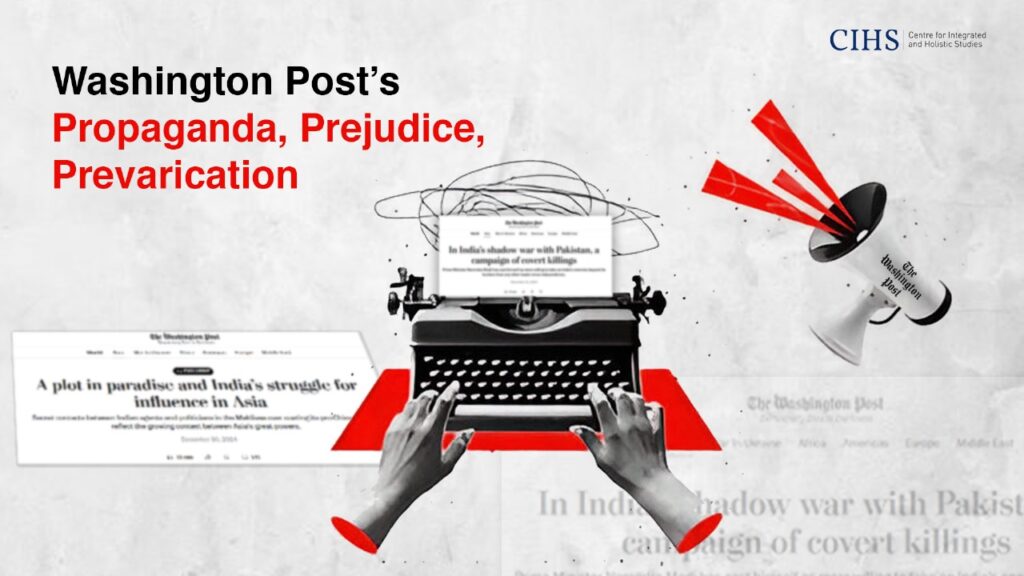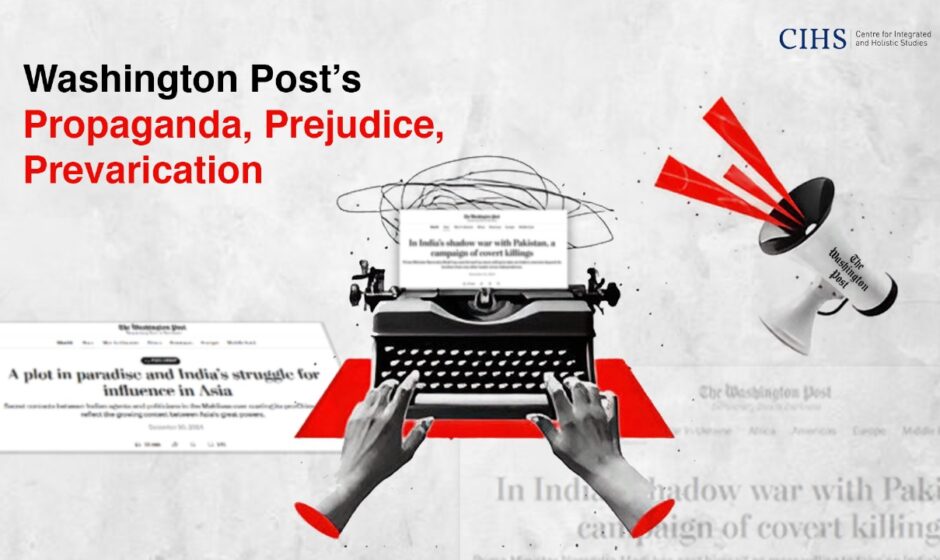Wild allegations that Bharat masterminded killings in Pakistan or sought to destabilize Muizzu regime in Maldives is part of WaPo’s agenda driven falsehoods.
Why is The Washington Post turning hostile towards Bharat? Has the editorial policy of The Washington Post biased and agenda driven? Who’s behind this framing against Bharat and its people? These are questions for which the Post may not have any plausible explanation even to its own readers.

In recent days, two such write ups that kicked up big controversy in Bharat relate to alleged killings done by Bharat in Pakistan and purported plot to destabilize Maldivian government headed by President Muizzu.
On December 31, 2024, WaPo published, “In India’s shadow war with Pakistan, a campaign of covert killings,” written by Gerry Shih. It is a glaring example of the paper’s disturbing record of bias and agenda-driven journalism.
Promptly, Randhir Jaiswal, spokesperson for Ministry of External Affairs, Government of India responded quoting Hillary Clinton, the former US Secretary of State, as saying, “You can’t keep snakes in your backyard and expect them only to bite your neighbours,” as a warning to Pakistan about terrorist organizations.
A day earlier, Gerry Shih and Siddharth Roy wrote, “A plot in paradise and India’s struggle for influence in Asia” to allege that there was a serious plot to destabilize a government led by President Muizzu.
The Washington Post went ahead with its own agenda driven write up though former Maldivian President Mohamed Nasheed, leader of opposition Maldivian Democratic Party debunked the write up. He stated that India has always supported democracy in the Maldives and will never engage in such acts.
Both the writer ups were nothing more than an attempt to make a sensational yearend with biased and heavily skewed narrative that undermines India’s legitimate national security concerns while conveniently ignoring political standing, mutual interests and Pakistan’s long-standing sponsorship of cross-border terrorism.
This kind of coverage necessitates a critical, incisive and unapologetic reaction since it not only misinforms global audiences but also raises disturbing issues about The Washington Post’s editorial biases and the agenda underlying its ongoing anti-India stance.
WaPo’s Double Standards and Troubling History
This is the same newspaper that frequently criticized countries like India who have made serious moves protect her sovereignty from unfriendly neighbours. While The Washington Post had the zeal to spread false narratives, it conveniently failed to report on issues back home in United States’ or its partners’ covert activities and extrajudicial actions.
For example, why was The Washington Post silent on CIA’s drone strikes in Pakistan’s tribal regions that killed scores of civilians? Where is the serious investigation of US role in destabilizing entire regions via proxy wars and targeted assassinations? The selective anger is obvious.
The Washington Post’s history is rife with paradoxes and instances of questionable journalism. Eugene Meyer, a billionaire and influential Republican, purchased the insolvent Post in 1933, promising the public that it was politically independent.
Meyer’s hostility to Roosevelt’s New Deal resulted in biased editorials and even pseudonymously authored news pieces that mirrored his ideological leanings. His wife, Agnes Ernst Meyer, contributed socialist ideas to the Post’s pages, spotlighting people such as John Dewey and Saul Alinsky, demonstrating the publication’s contrasting influences.
Meyer further shaped the paper’s ideological stance in1940s by using his political and family ties, such as bringing in his son-in-law Phil Graham as publisher. The Post’s political stance was tainted for decades by the ties with Georgetown elites and well-known political figures like the Kennedys.
In the twenty-first century, the paper’s coverage of Iraq War was blatantly erroneous with over 140 front-page articles endorsing the invasion by Bush administration while censoring criticism from within. Its present coverage follows this pattern of selective reporting and ideological scheming which includes publicly criticizing India while neglecting more significant structural problems in other spheres.
Baseless Allegations and Flimsy Evidence
There is serious lack of reliable evidence to support the article’s core argument stating that a string of assassinations in Pakistan had been planned by India’s intelligence agency, Research and Analysis Wing (RAW). The article makes extensive use of Pakistani officials, which is a notoriously untrustworthy source considering the country’s history of creating stories to divert attention away from its own shortcomings.
Pakistan’s Inter-Services Intelligence (ISI) has been the mastermind behind cross-border terrorism for decades, funding organizations like Jaish-e-Mohammed (JeM) and Lashkar-e-Taiba (LeT) that have caused chaos in India and beyond. Pakistan has been regularly accused by the international community of harbouring and funding terrorists, particularly by Financial Action Task Force (FATF) and United Nations. However, the story in The Washington Post ignores this fact and instead concentrates on unsupported allegations against India.
The article’s reliance on “Western officials” to support its assertions is absurd considering that these sources provide no hard evidence. The reported “evidence” consists of ambiguous allusions to WhatsApp messages and purported confessions that were taken under dubious conditions. Such little evidence would not be sufficient to support a real journalistic investigation, much less stand up in any court of law.
Ignoring the Root Cause: Pakistan’s State-Sponsored Terrorism
Pakistan’s unrelenting financing of terrorism is a major issue that must be addressed before any conversation regarding clandestine activities in South Asia can be considered complete. Pakistan has used terror as an instrument of state policy since it came into being. Numerous acts of terror against India, be it the 1947 Kabali raid, 2001 Parliament Attack, 2008 Mumbai attacks, 2016 Uri attack and 2019 Pulwama bombing, clearly bear Pakistan’s fingerprints.
Beyond India, Pakistan is a global hub for terrorism, as evidenced by its backing for Taliban’s comeback in Afghanistan and its role in providing sanctuary to Osama bin Laden in Abbottabad. The Washington Post piece, however, attempts to minimize this uncomfortable reality by portraying Pakistan as a helpless victim rather than an offender.
This must be taken into consideration when evaluating India’s purported actions as detailed in the article. India has a policy of “zero tolerance against terrorism” given that terror activities led to loss of thousands of its innocent citizens, taking proactive steps to eliminate terrorists operating from Pakistani territory. These operations which are motivated by Pakistan’s unwillingness or incapacity to destroy its terror infrastructure are acts of self-defense rather than aggression.
Compulsive hostility!
In the weekly media briefing of India’s External Affairs Ministry, spokesperson Randhir Jaisawal said, “I would say that both the newspaper and the reporter in question appear to nurse a compulsive hostility towards India. You can see a pattern in their activities. I leave you to judge their credibility. As far as we are concerned, they have none. As far as Pakistan is also mentioned in the article, so in Pakistan, I would like to remind you what Hillary Clinton said. And she said, and I quote, “you can’t keep snakes in your backyard and expect them only to bite your neighbours”.”
The WaPo’s Agenda: Opposition to India’s Rise?
One wonders why Bharat is often portrayed negatively in The Washington Post. Is it because India’s ascent to prominence threatens their agenda? Or is it because vested interests are threatened by India’s refusal to join any one bloc?
India has certainly caused a stir with its rise to prominence in the geopolitical and economic arenas. Its independent foreign policy, developing alliances and refusal to follow ‘a dictated line’ on war between Russia and Ukraine have possibly led to biased reporting. This pattern is nicely followed by The Washington Post story which aims to damage India’s reputation internationally.
A Call for Responsible Journalism
The Washington Post’s article is not just an attack on Bharat but serious dis-service to responsible journalism. With use of sensationalism, unsubstantiated claims and lack of critical context, the article undermines the trust of its readers and standards of objective and fair reporting.
Bharat has significant challenges and its solutions are worthy of careful consideration rather than unfounded accusations. Being a responsible global player, India has responsibilities to both its people and rest of the world. Accountability, however, needs to be grounded in reality rather than agenda-driven stories of a publication that has long since lost its moral compass.
It is imperative that The Washington Post investigates its own prejudices and recommits to search for truth. Its coverage of India will remain suspicious till then, not as a shining example of investigative journalism but rather as means to geopolitical manipulation.



